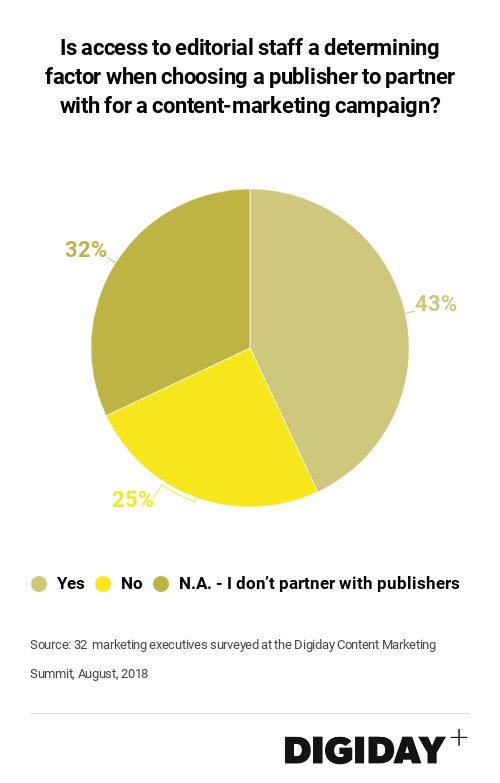Secure your place at the Digiday Publishing Summit in Vail, March 23-25
Digiday Research: Brands want access to editors for content marketing

This research is based on unique data collected from our proprietary audience of publisher, agency, brand and tech insiders. It’s available to Digiday+ members. More from the series →
Publishers who built content studios and embraced content marketing are facing slimming margins and demands for hard metrics.
One thing that more publishers could be doing to attract advertisers’ content marketing spend is offer up access to their editorial staff.
In a survey of marketing executives at the Digiday Content Marketing Summit last month, 43 percent of marketers said access to editors is a determining factor in deciding what publishers to partner with.
In general, advertisers prefer working with editorial writers because they produce high-quality content, are more trusted by readers and can more easily align the advertisers’ message with the site’s existing content. However, not all editorial staffers jump at the chance to work on projects for content studios. One staff member told Digiday in an earlier interview they were thankful, “We don’t have to do some of the terrible work they have to do.”

Getting editorial staff to contribute to to advertisers campaigns isn’t a new phenomenon. Many publishers like Conde Nast and Mental Floss have a history of editorial staffers chipping in on advertisers’ projects. Recently Refinery29 began pitching its staff and having them mingle with advertisers.
Smaller publishers engaging in content marketing like Food52 have included editorial access from their inception due to necessity rather than choice. With smaller teams, Food52’s limited resources meant it never separated its teams creating editorial content and ads.
By having editorial staffers contribute on content marketing campaigns, in addition to attracting advertisers, publishers might be hoping to alleviate their content studio’s rising production requirements. Work involving editorial staff can also develop deeper relationships between publishers and marketers. Quartz found that by using its editorial teams to create new, branded products, it was able to secure year-long contracts that it then used to fund other projects.
As publishers increasingly bet on content marketing for future revenues, more publishers could be inclined to ask their editorial staff to pitch in.
More in Marketing

‘The conversation has shifted’: The CFO moved upstream. Now agencies have to as well
One interesting side effect of marketing coming under greater scrutiny in the boardroom: CFOs are working more closely with agencies than ever before.

Why one brand reimbursed $10,000 to customers who paid its ‘Trump Tariff Surcharge’ last year
Sexual wellness company Dame is one of the first brands to proactively return money tied to President Donald Trump’s now-invalidated tariffs.

WTF is Meta’s Manus tool?
Meta added a new agentic AI tool to its Ads Manager in February. Buyers have been cautiously probing its potential use cases.





